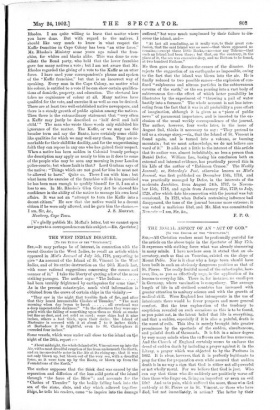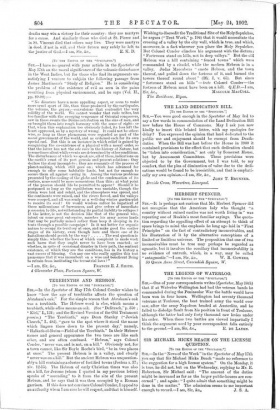THE MORAL ASPECT OF AN "ACT OF GOD."
[TO THE EDITOR Or TIIE "SPECTATOR."]
SIE,—All Christian readers must be profoundly grateful for the article on the above topic in the Spectator of May 17th. It expresses with striking force what was already simmering in many minds. I have nowhere seen it stated that an ob- servatory, such as that on Vesuvius, existed on the slope of Mount Pelee. Nor is it clear why a large town should have been built in such au obviously dangerous posit ion as that of St. Pierre. The really fruitful moral of the catastrophe, how- ever, lies, as you so effectively urge, in the application of its lessons to everyday life. There is, for instance, no small-pox in Germany, where vaccination is compulsory. The average length of life in all civilised countries has increased with greater attention to sanitary science and with the growth of medical skill. Were England less intemperate in the use of intoxicants there would be fewer paupers and more general comfort. But the true explanation of the tendency to scepticism revealed on such occasions as this is to be found, as you point out, in the latent belief that life is everything, and that a sudden, especially if it is also a painful, death is the worst of evils. This idea is merely brought into greater prominence by the spectacle of the sudden, simultaneous, and painful death of thousands. It is felt in a minor degree by very many minds when the sufferers are far less numerous. And the Church of England certainly seems to endorse the dread of sudden death by including a prayer against it in the Litany, a prayer which was objected to by the Puritans in 1662. It is clear, however, that it is perfectly legitimate to pray for time for preparation even while assured that sudden death is in no way a sign that God is either not all-powerful or not wholly moral. For we believe that God is just. Who can say that those who die suddenly are positively worse off than those who linger on, living an imperfect or even an evil life? And as to pain, which suffered the more, those who died suddenly at St. Pierre or in St. Vincent, or those who have died, but not immediately, in action ? The latter by their
deaths may win a victory for their country : they are martyrs for a cause. And similarly those who died at St. Pierre and in St. Vincent died that others may live. They were martyrs in deed, if not in will, and their future may safely be left to the justice of God.—I am, Sir, &c., E. K. D.







































 Previous page
Previous page